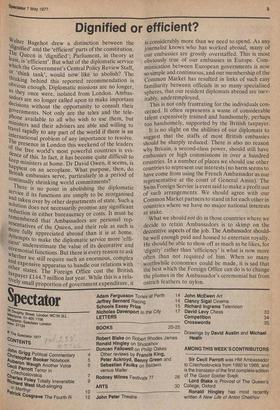Dignified or efficient?
Walter Bagehot drew a distinction between the ` dignified' and the 'efficient' parts of the constitution. r , he Queen is 'dignified'; Parliament, in theory at least, is 'efficient'. But what of the diplomatic service which the Government's Central Policy Review Staff, or 'think tank', would now like to abolish? The thinking behind this reported recommendation is °°vious enough. Diplomatic missions are no longer, as they once were, isolated from London. Ambassadors are no longer called upon to make important decisions without the opportunity to consult their 6'eLvernments. Not only are the telex and the telePlione available to all who wish to use them, but ministers and their advisers are able and willing to travel rapidly to any part of the world if there is an
he problem of any importance to resolve.
of thepresence in London this weekend of the leaders 1 the free world's most powerful countries is evi-nee of this. In fact, it has become quite difficult to ZeeP ministers at home. Dr David Owen, it seems, is u_aPPiest on an aeroplane. What purpose, then, do uritish embassies serve, particularly in a period of Continually shrinking world commitments? There is no point in abolishing the diplomatic service if its functions are simply to be reorganised and taken over by other departments of state. Such a °14tion does not necessarily promise any significant r eduction in either bureaucracy or costs. It must be
r_erriembered that Ambassadors are personal rep.
re of the Queen, and their role as such is more fully appreciated abroad than it is at home. Attempts to make the diplomatic service more `efficene underestimate the value of its decorative and e enionial functions. But there is every reason to ask a. Whether we still require such an enormous, complex 01;_cl expensive apparatus to handle our relations with states. The Foreign Office cost the British taivxePiayer £144.7 million last year. While this is a relaY small proportion of government expenditure, it is considerably more than we need to spend. As any journalist knows who has worked abroad, many of our embassies are grossly overstaffed. This is most obviously true of our embassies in Europe. Communication between European governments is now so simple and continuous, and our membership of the Common Market has resulted in links of such easy familiarity between officials in so many specialised spheres, that our resident diplomats abroad are inevitably, underemployed. This is not only frustrating for the individuals concerned. It often represents a waste of considerable talent expensively trained and handsomely, perhaps too handsomely, supported by the British taxpayer. It is no slight on the abilities of our diplomats to suggest that the staffs of most British embassies should be sharply reduced. There is also no reason why Briiain, a second-class power, should still have embassies or high commissions in over a hundred countries. In a number of places we should, use other countries to represent our interests (no harm seems to have come from using the French Ambassador as our representative at the court of General Amin). The Swiss Foreign Service is even said to make a profit out of such arrangements. We should agree with our Common Market partners to stand in for each other in countries where we have no major national interests at stake. What we should not do in those countries where we decide to retain Ambassadors is to skimp on the decorative aspects of the job. The Ambassador shouldbe well enough paid and housed to entertain royally. He should be able to show off as much as he likes, for ,dignity' rather than 'efficiency' is what is now more often than not required of him. When so many worthwhile economies could be made, it is sad that the best which the Foreign Office can do is to change the plumes in the Ambassador's ceremonial hat from ostrich feathers to nylon.






































 Previous page
Previous page